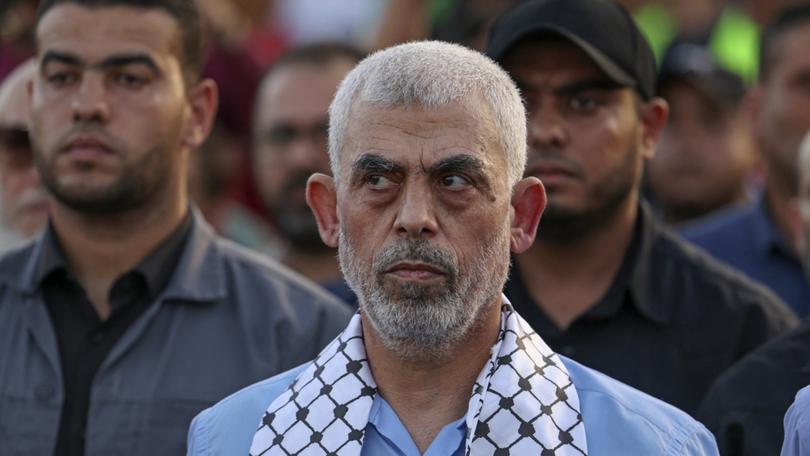Yahya Sinwar killed: Hamas leader’s death sends a grim message to Israel’s enemies in the Middle East
Make no mistake, Sinwar’s death is belated justice for terrible crimes. The man was a monster.

Israel has sent a ruthless message to its enemies in the Middle East: We always get our man. And this time it was the most senior Hamas terrorist of them all.
Yahya Sinwar, who was killed by tank fire yesterday, was the depraved mastermind behind the October 7 attacks last year that saw 1,200 Israelis murdered in the most barbaric manner imaginable and more than 250 taken hostage.
He didn’t just want to kill Israelis but the idea of peace itself.
Sign up to The Nightly's newsletters.
Get the first look at the digital newspaper, curated daily stories and breaking headlines delivered to your inbox.
By continuing you agree to our Terms and Privacy Policy.Sinwar’s death is belated justice for terrible crimes. As the UK Defence Secretary John Healey said: “I for one will not mourn the death”, and nor will any mainstream politician in the West.
The man was a monster, personally responsible for plunging the Gaza Strip into decades of misery. He founded the Hamas security service, Majd, in the late 1980s and oversaw the hunting down of suspected Israeli collaborators. Those accused of co-operating with the Jewish state were shot, hanged or tortured to death.
Since the full-scale invasion of Gaza by Israel last year, he has been the chief Hamas military commander in the war zone. Political leader Ismail Haniyeh was widely seen as the overall chief of Hamas until his assassination in Tehran last July, but Haniyeh had no direct control over the terrorist foot soldiers.
Sinwar spent much of his life in Israeli prisons, serving four concurrent life sentences following his arrest in 1988. But he was released in 2011 as part of a prisoner exchange, which saw more than 1,000 Palestinians freed in exchange for a single Israeli soldier, Gilad Shalit.
Since then, he is thought to have spent much of his life underground, in the network of Hamas tunnels. It is believed one of these tunnels led to a UN-operated school in Gaza, being used as a refugee centre. It was also a meeting point for senior Hamas terrorists, who used homeless civilians as human shields.
Israel has repeatedly proved in recent weeks that its intelligence services have infiltrated every aspect of their enemies’ power structure. Its communication systems have been compromised in multiple ways, with explosives planted in pagers and walkie-talkies, while no mobile phone can be considered secure.
But while Israel’s decapitation of key enemies such as Hezbollah’s Hassan Nasrallah and Hamas’s Ismail Haniyeh relied on its unique intelligence-gathering skills, Sinwar’s death at the hands of a tank commander was the result of a chance encounter. He fired at a group of terrorists from close range without knowing Sinwar was among them.
The systematic assassination of Hamas’s leadership sends a chilling message to their paymasters in Iran and to any Arab countries that might be tempted to support the Palestinians. No political or military leader is safe.
The Ayatollah Khamenei in Tehran and Iran’s president Masoud Pezeshkian, too, would be well-advised not to launch a war against Israel, not just for fear of provoking the US into entering the conflict on Israel’s side, but because they might be signing their own death warrants.
Mass decapitation of the terrorist commanders is proving a highly successful strategy. There are still thousands of guerrillas, heavily armed and now shrieking for vengeance, but they lack effective co-ordination.
In Lebanon, no new wave of leaders has emerged to replace those killed or maimed in the pager attacks. And in the Gaza Strip, no obvious replacement for Sinwar exists. His death will not signal an immediate end to the fighting.
Instead, the Hamas militia will do what Hezbollah’s foot-soldiers have done – keep fighting without any plan. Both armies have a death-cult mindset and many will be determined to carry on until they are killed or run out of ammunition.
Only one thing is certain: another Yahya Sinwar is bound to emerge. The man killed yesterday was born in the Khan Younis refugee camp in 1962 and orphaned as a child, when his parents were killed in an Israeli raid.
His life became one long exercise in revenge. At worst, his legacy will be a cult of vengeance among today’s orphans. We have to hope the manner of his death does something to counter that.
Mark Almond is director of the Crisis Research Institute in Oxford
